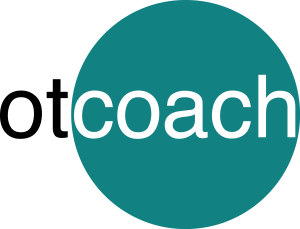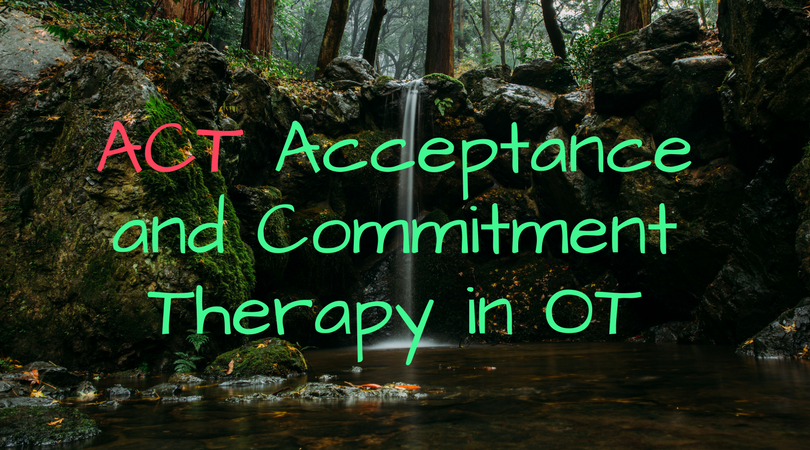| Reflections on ACT as a tool for OTs
My first real encounter with ACT, was on a 6 week ‘Positive Acceptance’ Course 3 years ago, when I was myself, going through a very challenging chapter in my life. ACT stands for Acceptance Commitment Therapy. Classed as Third wave Cognitive Behavioural Therapy, it differs by incorporating mindfulness and ‘self compassion’. The most important lesson for me, was to make space for what I was feeling, rather than fight it. Fighting activates the ‘struggle switch’, driving depression and anxiety further in, so that we end up feeling depressed about being depressed. Believing that the world should be a certain way and we should not suffer, is unfortunately, in part responsible for the struggle. Author and expert in ACT, Russ Harris refers to this as the ‘Happiness Trap’ – the book is a great primer, as well as a tool for clients. Reality, there are some things we just cannot control – ‘bad’ things do happen. At some point in our lives, we will all face loss of someone important to us and the associated personal pain that accompanies this, Our sadness, may well be the ‘mirror’ for the happiness we have had and are grateful for – accompanying this, can be fears that life or we will never be the same again/love again/be able to cope or that part of us, has gone with that person. Facing change is challenging – it is all around us, all the time, part of life. ACT refers to this increasing ‘struggle’ as ‘fusion’. ACT does not require that we get rid of our thoughts, as in ‘thought stopping’ or ‘disputation’ in C.B.T, but rather we accept our thoughts by making space for them, (expansion) Simple, yet powerful tools enables us to then gain some distance and become an observer, recognising that thoughts are ‘streams of words’ and just that ! This is called ‘defusion’. Whereas, in C.B.T, a thought is framed as ‘helpful’ or ‘unhelpful’, there is no dysfunctional label, per se – just the question of whether behaviour is workable in the context of ‘value guided living’ – a way of being that we choose, rather than an end goal. So, Act is more concerned with the behavioural function of thoughts, rather than their form – does the behaviour create a rich, satisfying, fulfilling life ?. Commitment refers to the very active nature of the approach, In Coaching, we would ask the client are they ‘ready, willing and able’ to enter the coaching relationship? – With ACT, the process starts with the mindfulness of simply ‘being’, before ‘doing’ and ‘having’. Commitment refers to being ‘willing’ to hold/make space for discomfort, as part of the journey towards taking ‘workable’ actions to create or return to a richer, more satisfying or fulfilling life. Part of beauty of ACT, lies in the simplicity of techniques you can use with your client when you introduce ACT – often physical exercises that illustrate the metaphors of ‘struggle’ and what happens to your awareness, when you are against the wall. . Saying to yourself, I’m noticing that I’m thinking ‘x’, noticing that you are noticing, naming your stories, when my mind goes wandering, eg Oh, it’s the perfect love story ! oh, there is it again, the ‘bad parent story’ is part of being an ‘observer’ and thus defusion. This negates experiential avoidance. I remember the first mindfulness session I attended a few years ago. I found myself saying, well surely, this is the same as relaxation? Mindfulness creates the awareness of bodily sensation and what is happening now, rather than progressive relaxation, that aims to elicit the difference between tension and relaxation. For the developing ACT practitioner, the approach needs to be fully embraced and authentic on a personal level. It fits beautifully with a social model of Recovery, which requires collaboration and a shift of focus, from ‘fixing’ , to enabling people to lead richer, more fulfilling lives according to their own values. For those with an enduring mental health challenge, they will inevitably continue to experience thoughts that are uncomfortable, at times – cure is not the goal. ACT takes us away from a medical model that can pathologise (in order to predict, provide evidence base for treatment) and creates a level playing field that is freer from harsh judgements about ourselves and others – it brings us to what it is to be deeply human – our compassionate self. This fits beautifully with the Recovery agenda – reality for many people who suffer depression and /or anxiety, , thoughts will spring back and when they do, it can feel that we are experiencing the pain afresh. ACT, through developing acceptance strategies, self compassion and greater mindfulness, creates greater psychological flexibility and thereby, sets us up to be more resilient. On a personal note, I increasingly notice what I am grateful for, from simple pleasures such as a bubble bath, to the ability to embrace discomfort as part of natural living and feel the relief of ‘bouncing back’, because I have made space for, rather than avoided what wasn’t workable. And, in so doing, I have come to the reassuring realisation that life is full of a myriad of experience, not ‘good’ or ‘bad’, just REAL !! Wendy Allonby (wendy@allonby.fslife.co.uk Do you need help starting a new OT business or enterprise? Maybe you already work independently but would benefit from working with a coach to move your business forward, develop marketing plans and new services?Are you an OT working in the NHS or Social Care and are struggling to find enjoyment and passion in your work?Call or email us today for a free consultation and see how OTCoach could help you:jen@otcoach.com 07772267004
|


